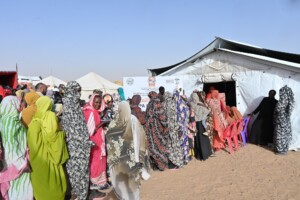TRACKS trial continues in Sudan after six months of detention
Three leading civil society activists will soon reach their sixth month of detention on charges related solely to their work and affiliation with the Centre for Training and Human Development (TRACKS), a group of international and Sudanese activist organisations said.
Three leading civil society activists will soon reach their sixth month of detention on charges related solely to their work and affiliation with the Centre for Training and Human Development (TRACKS), a group of international and Sudanese activist organisations said.
The organisations have serious concerns about the detained TRACKS director Khalafallah El Afif Mukhtar, trainer Midhat Afifeldin Hamdan, and Mustafa Adam, Director of El Zarga Organisation for Rural Development – and seven other activists affiliated with the Sudanese NGO. Not only because of the “baseless” charges but also because the court proceedings thus far have “not met international and regional human rights standards on the right to a fair trial, including the right to a public hearing”.
TRACKS is a national non-governmental organisation that provides training on a variety of subjects, from information technology to human rights. The members now face criminal charges, including crimes against the state which carry the death penalty.
In a joint call released today, the African Centre for Justice and Peace Studies (ACJPS), El Khatim Adlan Centre for Enlightenment (KACE), Sudan Democracy First Group (SDFG), Sudo UK, International Refugee Rights Initiative, Sudan Consortium, and the Darfur Bar Association (DBA) express their concerns about the court proceedings against the accused.
The defendants have not been provided with a written list of the charges they face, or been given copies of the evidence for the crimes alleged in order to prepare a defence for court sessions. In addition, civil society activists, including journalists, have been obstructed from attending the trial by court police and subjected to harassment and intimidation, “including having their photos taken during court sessions”.
The defence lawyers have not seen the copies of the evidence that the prosecutors use, such as lists of names, transcripts of WhatsApp conversations, and documents and videos that were found on laptops seized during a raid on TRACKS in February 2016. The prosecutors use photographs from social media of the accused TRACKS members, which the activists believe is an attempt to intimidate them.
Photographs of staff members' family and friends presented to the court could be “an attempt to intimidate the individuals involved”
Accusations
The organisations write that the defendants have been accused of being responsible for the International Criminal Court indictment against President Omar Al Bashir and the application of US sanctions against Sudan. It has also been alleged that TRACKS has been conducting work on behalf of El Khatim Adlan Centre for Enlightenment & Human Development (KACE), a pro-democracy NGO that also works to promote multiculturalism in Sudan. It has been closed by the Sudanese authorities since 2012, and is now registered in Uganda.
“The practice of issuing criminal charges against activists and human rights defenders has become an established tool to silence dialogue about human rights and civil society,” said Abdelrahman Gasim of the Darfur Bar Association. He found the mentioned evidence “unconvincing as to how the work of TRACKs staff and affiliates constitute crimes against the state”.
Their trial and that of other activists was supposed to begin on 24 August, but was postponed several times. The next court proceedings were planned to take place at Central Khartoum Courthouse mid-November.
Deteriorating freedom
Civil society organisations and groups are routinely threatened with closure, and activists, human rights defenders, and journalists have faced harassment, intimidation, and criminal charges levied by the state for their affiliation with Sudan’s civil society movement and for their human rights work, the statement continues.
Monim El Jak, Executive Director of Sudan Democracy First Group: “These sweeping powers to hold detainees for up to four and a half months without charge or judicial review, granted under the 2010 National Security Act have been repeatedly used to arbitrarily detain civil society activists”.
“This apparent campaign against TRACKs represents the latest threat to the rapidly deteriorating space for civil society in Sudan, and a trial against civil society and the human rights movement itself”, said Andie Lambe, Executive Director of the International Refugee Rights Initiative.











 and then
and then